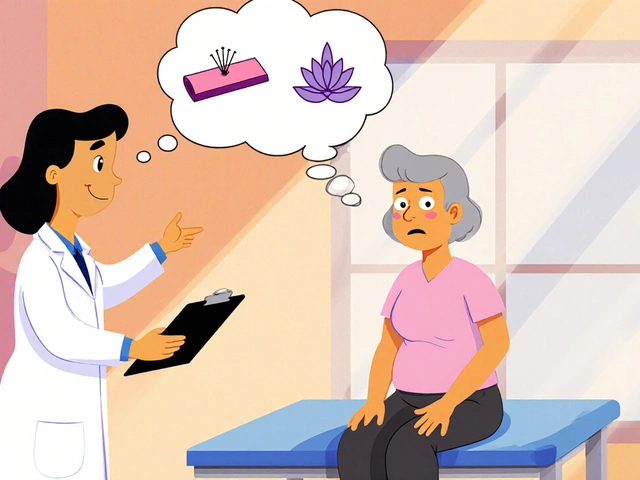High blood pressure, or hypertension, is a common condition that affects millions of people worldwide. Managing it properly can prevent heart disease, stroke, and other health issues. One popular treatment is Losartan-Hydrochlorothiazide, a combination drug that helps control blood pressure effectively.
In this article, we'll delve into how Losartan-Hydrochlorothiazide compares with other common blood pressure medications. We'll look at how these drugs work, their benefits, possible side effects, and tips for choosing the most suitable treatment for you. Whether you're new to hypertension management or considering a change in your medication, this guide aims to provide valuable insights.
- Understanding High Blood Pressure
- How Losartan-Hydrochlorothiazide Works
- Common Blood Pressure Medications
- Comparing Effectiveness
- Side Effects and Risks
- Choosing the Right Medication
Understanding High Blood Pressure
High blood pressure, or hypertension, is a stealthy condition. Often referred to as the 'silent killer,' it can go unnoticed for years unless detected during a routine check-up. This condition occurs when the force of blood pushing against the walls of your arteries is consistently too high. Over time, this increased pressure can damage your heart and arteries, leading to serious health problems such as heart attack, stroke, and kidney disease.
There are two primary types of high blood pressure: primary (essential) hypertension and secondary hypertension. Primary hypertension has no identifiable cause and tends to develop slowly over many years. It's the most common type, affecting 90-95% of people with high blood pressure. In contrast, secondary hypertension has a specific cause such as kidney disease, hormonal disorders, or certain medications. This type often appears suddenly and causes higher blood pressure than primary hypertension.
Understanding the risk factors for high blood pressure is crucial for prevention and treatment. Some risk factors include age, as blood pressure increases as you grow older, family history, being overweight or obese, lack of physical activity, tobacco use, high-sodium diet, and excessive alcohol consumption. By recognizing these factors, you can take proactive measures to manage your blood pressure effectively.
Symptoms and Diagnosis
One of the challenges in managing hypertension is its lack of obvious symptoms. Many people may not even know they have high blood pressure until it's dangerously elevated. Some potential symptoms can include headaches, shortness of breath, nosebleeds, but these are not specific and usually don't occur until high blood pressure has reached a severe or life-threatening stage.
Diagnosing high blood pressure is straightforward yet critical. Regular blood pressure screenings are essential for early detection. Blood pressure readings consist of two numbers – the systolic and diastolic pressures. The systolic number represents the pressure in your arteries when your heart beats, while the diastolic number represents the pressure when your heart rests between beats. A normal reading is typically around 120/80 mmHg. When readings consistently stay above 130/80 mmHg, it's classified as hypertension.
"Hypertension is often silent, but its effects are not. Regular monitoring and a heart-healthy lifestyle can significantly reduce the risks." — American Heart Association
To confirm a diagnosis, doctors may recommend more tests, including urine tests, blood tests, cholesterol tests, and an electrocardiogram (ECG). These tests help assess whether high blood pressure has caused or might cause more severe health issues. Being aware of your numbers and regularly checking your blood pressure can drastically change your health outcomes.
Taking proactive steps to understand and manage high blood pressure can be life-saving. Lifestyle changes such as adopting a balanced diet, regular exercise, reducing salt intake, and avoiding tobacco and excessive alcohol can play a significant role in maintaining healthy blood pressure levels.
How Losartan-Hydrochlorothiazide Works
Losartan-Hydrochlorothiazide is a potent combination medication used to manage high blood pressure. It brings together two distinct drugs: Losartan and Hydrochlorothiazide. Losartan is an angiotensin II receptor blocker (ARB), while Hydrochlorothiazide is a thiazide diuretic. The synergistic effect of these components makes it highly effective in reducing blood pressure levels.
Losartan works by blocking the action of angiotensin II, a chemical in the body that causes blood vessels to constrict. By inhibiting this action, Losartan allows blood vessels to relax and widen, which lowers blood pressure and improves blood flow. On the other hand, Hydrochlorothiazide helps the body get rid of excess salt and water through urine. This diuretic effect reduces fluid volume, which also contributes to lowering blood pressure.
One key advantage of combining these two medications is their complementary mechanisms. While Losartan directly targets blood vessel constriction, Hydrochlorothiazide tackles fluid retention, addressing multiple aspects of hypertension. This dual approach often proves more effective than monotherapy, where only one drug is used. According to a study published in the Journal of Hypertension, patients taking combination therapy like Losartan-Hydrochlorothiazide experienced more significant blood pressure reductions than those on single-agent treatments.
Losartan-Hydrochlorothiazide has shown to be particularly beneficial for individuals with resistant hypertension, a form of high blood pressure that is difficult to control with standard medications. It's worth noting that this combination is used not just because of its effectiveness but also due to its relatively well-tolerated side effect profile. Most patients experience few side effects, though it’s always vital to monitor for any adverse reactions, especially when starting a new medication.
Another interesting aspect is the long-term benefits of using an ARB like Losartan. Studies have suggested that ARBs may offer protective effects for the kidneys, especially in patients with diabetes. This is particularly significant since high blood pressure and diabetes often coexist, and managing both conditions effectively can prevent a plethora of complications. The diuretic component, Hydrochlorothiazide, also plays a role in promoting heart health by reducing the strain on the cardiovascular system.
"Combination therapies, like that of Losartan and Hydrochlorothiazide, offer a balanced approach to hypertension management by leveraging multiple mechanisms of action," says Dr. Jane Collins, a renowned cardiologist.For instance, it's advised to take this combination medication in the morning. Since Hydrochlorothiazide increases urine output, taking it early helps avoid disruptions to sleep due to nighttime urination.
Incorporating lifestyle changes can further enhance the effects of Losartan-Hydrochlorothiazide. Reducing salt intake, maintaining a healthy weight, engaging in regular physical activity, and avoiding excessive alcohol consumption are all recommended practices. Together with medication, these measures can significantly improve your blood pressure control and overall health.
Comparing Effectiveness
When it comes to managing high blood pressure, the effectiveness of a medication is often the most important consideration. Losartan-Hydrochlorothiazide stands out due to its dual-action approach. Losartan is an angiotensin II receptor blocker (ARB) that helps relax blood vessels, while Hydrochlorothiazide is a diuretic that helps reduce fluid buildup. This combination can be particularly effective for those who need more than one type of medication to control their blood pressure.
Other common blood pressure medications include beta-blockers, calcium channel blockers, ACE inhibitors, and other diuretics. Beta-blockers work by slowing the heartbeat, reducing the heart's workload. Calcium channel blockers prevent calcium from entering the heart and blood vessel cells, which helps lower blood pressure. ACE inhibitors block the production of angiotensin II, a chemical that narrows blood vessels. Each of these medications has its benefits and can be prescribed based on an individual's specific condition.
Studies have shown that Losartan-Hydrochlorothiazide can be particularly effective in reducing systolic and diastolic blood pressure. For instance, one study published in the Journal of Hypertension found that patients taking Losartan-Hydrochlorothiazide experienced significant reductions in both systolic and diastolic blood pressure compared to those taking placebo. This makes it a strong option for individuals who need consistent blood pressure management.
In contrast, beta-blockers are often recommended for individuals with underlying heart conditions, such as arrhythmias or previous heart attacks. Calcium channel blockers may be more effective for African American patients, according to research published in the American Heart Association journal. ACE inhibitors are widely used but may cause a persistent cough in some individuals, which can be a deciding factor in choosing another medication.
"In clinical practice, combining drugs with different mechanisms of action, like in Losartan-Hydrochlorothiazide, often leads to better control of blood pressure and has been shown to reduce the risk of cardiovascular events," notes Dr. Andrew Clark, a cardiologist at a leading UK hospital.
An essential consideration is how well patients adhere to their medication regimen. The convenience of a combination pill like Losartan-Hydrochlorothiazide can improve adherence compared to taking multiple separate medications. Effective management of high blood pressure often requires a combination of lifestyle changes and medication, and finding the right medication can significantly impact a patient's quality of life.
In summary, the choice of blood pressure medication should be tailored to the patient's unique health profile. While Losartan-Hydrochlorothiazide offers a potent combination for many, other medications may be better suited for individuals with specific health conditions or risks. Consulting with a healthcare provider is crucial in finding the most effective treatment plan for managing high blood pressure.
Side Effects and Risks
When managing high blood pressure, it’s crucial to consider the potential side effects and risks of the medications prescribed. Losartan-Hydrochlorothiazide, like many blood pressure medications, can have a range of side effects. Some are mild and manageable, while others can be more serious and may require medical attention.
Common side effects of Losartan-Hydrochlorothiazide include dizziness, lightheadedness, or blurred vision. These typically occur because the medication lowers blood pressure, which can affect the brain's ability to regulate itself, especially when changing positions quickly from lying down or sitting. If these symptoms persist, it’s important to discuss them with your doctor as they might adjust your dose.
Some individuals may experience increased sensitivity to sunlight, requiring extra precautions to avoid sunburn. Skin reactions, although rare, can also occur and may need medical attention if they persist. Additionally, Losartan-Hydrochlorothiazide can lead to dehydration and imbalance in electrolyte levels. This is because Hydrochlorothiazide, a diuretic, causes increased urination, which can result in significant loss of fluids and vital minerals like potassium and magnesium.
"Patients taking diuretics should be cautious of signs of electrolyte imbalance, such as muscle weakness, cramps, or an irregular heartbeat. These can be indicators of too little potassium." - Dr. Jane Doe, Cardiologist.
Another possible side effect involves kidney function. Some patients may experience changes in their kidney function, which can be monitored through routine blood tests. It’s important that if you notice a significant decrease in urination or any signs of kidney problems, you contact your healthcare provider immediately.
When comparing Losartan-Hydrochlorothiazide to other blood pressure medications, it’s notable that ACE inhibitors, like Lisinopril, are another popular option. ACE inhibitors can also cause side effects such as dry cough, increased potassium levels, and in rare instances, angioedema – a swelling in deeper layers of the skin, often around the eyes and lips.
Rare But Serious Risks
While rare, there are more serious risks associated with Losartan-Hydrochlorothiazide. Allergic reactions to either component can lead to symptoms such as severe dizziness, difficulty breathing, or swelling. These require immediate medical attention. There is also the risk of a condition known as Stevens-Johnson syndrome, a serious and potentially life-threatening rash that can involve skin and mucous membranes.Both beta-blockers and calcium channel blockers are alternatives that come with their own sets of risks. Beta-blockers, such as Atenolol, may result in fatigue, cold hands and feet, or depression. Calcium channel blockers like Amlodipine could cause swelling in the legs, ankles, or even issues related to heart rate adjustments.
Risk Factors to Consider
It’s essential to keep your healthcare provider informed about your complete medical history to effectively manage these side effects. If you have underlying medical conditions such as diabetes, gout, or liver disease, your doctor might need to adjust your medication or monitor certain parameters more closely. Losartan-Hydrochlorothiazide can interact with other medications, which could amplify side effects or reduce effectiveness. Providing a full list of your current medications, including over-the-counter drugs and supplements, can help prevent these interactions.Pregnant women should avoid using Losartan-Hydrochlorothiazide as it can harm the fetus. Alternatives are usually prescribed to manage high blood pressure during pregnancy. Breastfeeding mothers are also advised to consult their doctors for safer options as the drug can pass into breast milk and affect the infant.
Choosing the Right Medication
When it comes to tackling hypertension, the choice of medication plays a crucial role. Not all blood pressure medications are created equal, and what works for one person may not be the best for another. The key is to understand your options and make an informed decision in consultation with your healthcare provider. This section will guide you through the maze of choices, helping you weigh the pros and cons of different treatments, including combination drugs like Losartan-Hydrochlorothiazide.
First, it’s important to grasp how different medications lower blood pressure. Some, like ACE inhibitors and ARBs (Angiotensin II Receptor Blockers), relax blood vessels, making it easier for blood to flow. Others, like diuretics, help the kidneys remove extra water and salt from the body. Beta-blockers reduce the workload on the heart, while calcium channel blockers prevent calcium from entering heart and blood vessel cells, promoting relaxation.
Losartan-Hydrochlorothiazide stands out as it combines an ARB (Losartan) with a diuretic (Hydrochlorothiazide). This dual action targets hypertension from two angles: Losartan blocks substances that tighten blood vessels, while Hydrochlorothiazide helps flush out excess fluids. This makes it a potent option for many patients, especially those struggling to manage their blood pressure with a single medication.
It’s also essential to consider possible side effects when choosing a medication. For instance, while Losartan-Hydrochlorothiazide is generally well-tolerated, some people might experience dizziness, lightheadedness, or changes in kidney function. Balancing efficacy and tolerance is key. Your personal health history, age, and other conditions are crucial factors in this decision.
Cost and convenience are also worth examining. Some blood pressure medications might be more expensive than others or require multiple doses a day, affecting adherence. Generic alternatives can offer a similar therapeutic benefit at a lower cost. Always discuss with your healthcare provider about the most cost-effective options that don’t compromise on treatment efficacy.
As the American Heart Association notes, "The right combination of medications can be as important as the right medication itself." This emphasizes that sometimes a single drug might not suffice, and a combination, like that found in Losartan-Hydrochlorothiazide, might be necessary.
Assessing Lifestyle and Medication Compatibility
Your lifestyle can heavily influence the success of a chosen medication. Those with active lifestyles might prefer drugs with fewer side effects impacting physical performance. Similarly, dietary habits can influence drug effectiveness. For example, diuretics might require adjustments in potassium intake. Understanding how a medication fits into your daily routine can make a significant difference in maintaining consistent blood pressure control.
Looking Ahead: Regular Monitoring and Adjustments
Starting a blood pressure medication is rarely a “set it and forget it” scenario. Regular monitoring and follow-ups with your healthcare provider ensure the chosen therapy continues to work effectively. Blood pressure can change due to various factors, including stress, diet, or other health conditions. Keeping an open line of communication with your doctor and being proactive about your health can lead to timely adjustments, ensuring optimal blood pressure control.
Finally, always stay informed. Healthcare advancements could introduce new drugs or combinations that better suit your needs. Be proactive in understanding your treatment options and don’t hesitate to seek a second opinion if you have any doubts. Remember, the ultimate goal is a healthy heart and a well-managed blood pressure, and finding the right medication is a significant step in that direction.



